May 27, 2025 | 14:25 GMT +7
May 27, 2025 | 14:25 GMT +7
Hotline: 0913.378.918
May 27, 2025 | 14:25 GMT +7
Hotline: 0913.378.918
Tan Trieu islet is located in Tan Binh commune, Vinh Cuu district, Dong Nai. Not only does this location have renowned specialties, but it also serves as a tribute to the ancient progenitors who discovered the realm.
In Tan Binh commune, 10 kilometers along Highway 24 from the city center of Bien Hoa, there is a flat road and rows of luxuriant pomelo gardens.
Tan Binh is now a model new rural commune, the orchards are cultivated according to the ecological process, the streets and alleys are covered with clean concrete, and the two sides are planted with a variety of colorful flowers that bloom under the sun, leading to large houses and creating a very tranquil and beautiful countryside.
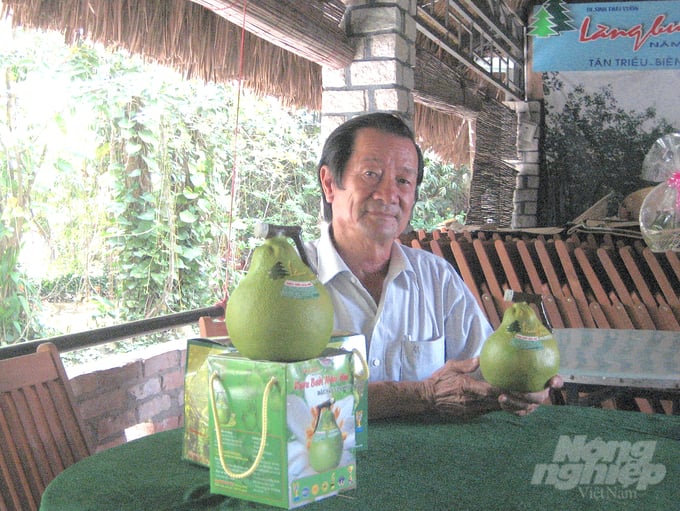
Nam Hue, a pioneer in planting organic pomelos and developing the Tan Trieu pomelo brand with a tourism model. Photo: Tuy Hoa.
Tan Trieu is one of the earliest communities in Dong Nai, and it is situated on a small island surrounded by the fertile Dong Nai River, which has remained so for generations due to its alluvial layer. In addition, for the past century, this land has been the most suitable for pomelo trees.
Nam Hue, 80, is the sixth generation of his family to reside on the island of Tan Triueu. He stated that the land was once used for betel plantation. Betel leaves from Tan Trieu are renowned for their aroma and piquant flavor, which were traded across the nation at the time. Regarding the pomelo plants, they were planted in the middle of the 19th century, beginning with two plants cultivated by a priest who carried them from Brazil to the Tan Trieu cathedral shortly after its inauguration.
They are delicious pomelos orange-tasting sweet pomelos and guava-tasting pomelos, the two most popular varieties that comprise the brand name Tan Trieu pomelo. Perhaps due to the soil's compatibility, these two pomelo trees produced an abundance of fruits with a delectable flavor, thin skin, sweet and fragrant aroma, and a prolonged ripening period than other varieties.
People then arrive to request seeds and trim branches for replanting. Soon, nearly every home grew pomelos.
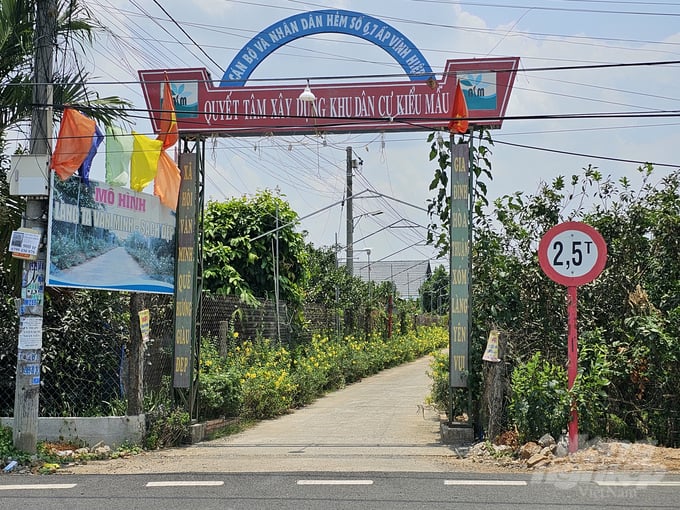
The countryside of Tan Binh today is not only beautiful and peaceful, but also thrives on sustainable agriculture and ecological agriculture. Pictured is one of the dozens of "green, clean, beautiful" alleys in Tan Binh commune. Photo: Hong Thuy.
Since the middle of the twentieth century, Tan Trieu Pomelo has followed in the footsteps of merchants present in the majority of eastern provinces. Pomelo from Tan Trieu islet is gaining widespread recognition. Since then, more pomelos have been grown in Tan Trieu.
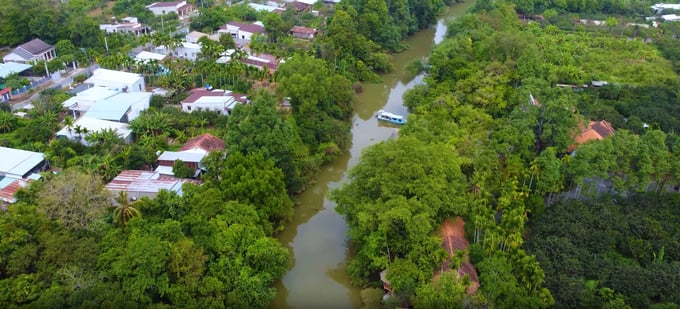
Tan Trieu canal, the place that changes the appearance of Tan Trieu Island today. Photo: Tuy Hoa.
Currently, the islet of Tan Trieu has more than twenty varieties of pomelo. In recent years, residents have also brought green skin pomelo and Nam Roi pomelo for cultivation in Tan Trieu. Moreover, these imported pomelo varieties are tastier than their "original" counterparts.
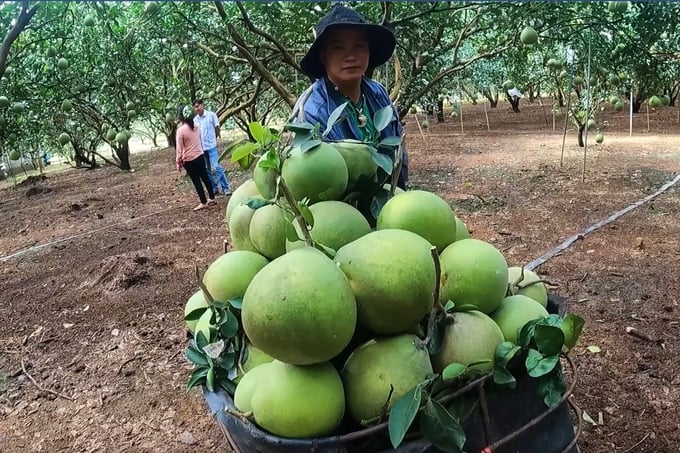
Tan Trieu Canal for many generations has accumulated alluvium, creating specialty pomelo gardens that are nowhere to be found. Photo: Hong Thuy.
Tan Binh commune was recognized as a model rural commune at the start of 2023, and the entire traffic system, including inter-commune roads, Huong highways, village roads, hamlets, and alleys, has been asphalted. In Dong Nai province, the health, education, and cultural systems all meet the Model New Rural Criteria. Internet and information systems reached all five hamlets. Tan Binh commune is becoming one of the most desirable rural areas to reside in. According to Vinh Cuu district's planning, Tan Binh commune will be a strictly agricultural commune with a focus on developing agriculture, services, and tourism, with orchards as regional specialties. Particularly, Tan Trieu islet has more than 200ha of pomelos, the majority of which are grown in accordance with the organic VietGAP process.
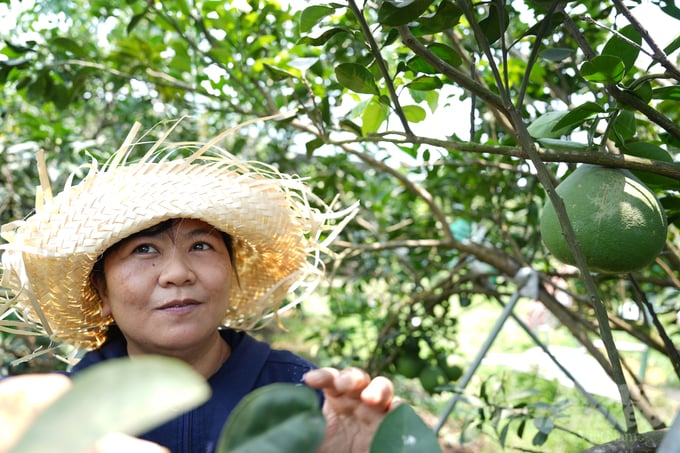
Do Thi Thu Huong, in Vinh Hiep hamlet, owns a pomelo garden with a clean process. Photo: Hong Thuy.
In fact, locals have long been aware of sustainable and secure cultivation practices. Do Thi Thu Huong from the hamlet of Vinh Hiep stated, "My family has five rods of orange-flavored, delicious pomelos, many of which are 20 years old. These trees are known as ancient pomelos, and their fruit is larger and of higher quality than that of younger trees. Traders only evaluate the quality by observing the tree and its fruit, and they pay a premium for it. This pomelo garden has been cultivating VietGAP under the supervision of local agricultural officials for nearly ten years. After a few years, I've observed the tree's gradual recovery; despite bearing fewer fruits, the tree is robust and the fruit is of acceptable quality. Some gardens, which I am familiar with, still use a great deal of chemical fertilizers and pesticides, the fruit is abundant, but the quality of the citrus is erratic and poor, not to mention the tree's brief lifespan of just over ten years.
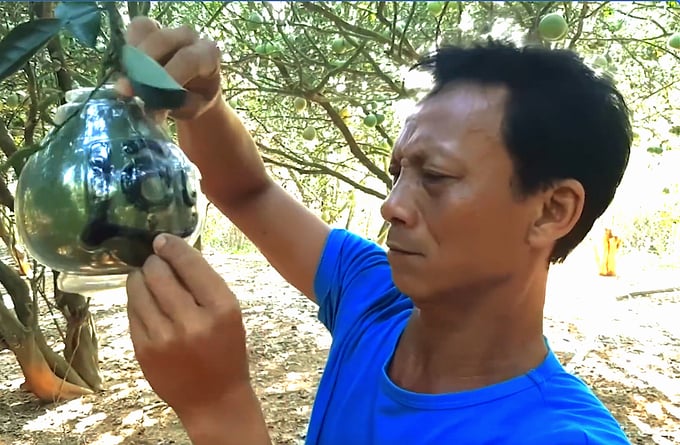
Ngo Van Son, who is known as the "boss" of shaping pomelos, increases the value of pomelos 10 times. Photo: Hong Thuy.
Nam Hue was a pioneer in the cultivation of ecological pomelos in tandem with ecotourism in Tan Trieu more than two decades ago. The original design calls for a handful of tiny leaf huts scattered throughout pomelo gardens, along the margins of fish ponds and canals, for visitors to visit and rest. He has maintained his initial business philosophy until this point. This is how to introduce as many people as possible to Tan Trieu's pomelo and pomelo-based products, such as tea, wine, salad, and smoothies, which are high-quality, healthy, and enticing enough to encourage customer loyalty.
"Tan Trieu pomelo is a native delicacy and the islanders' source of pride; we must introduce it to as many people as possible," said Mr. Nam.
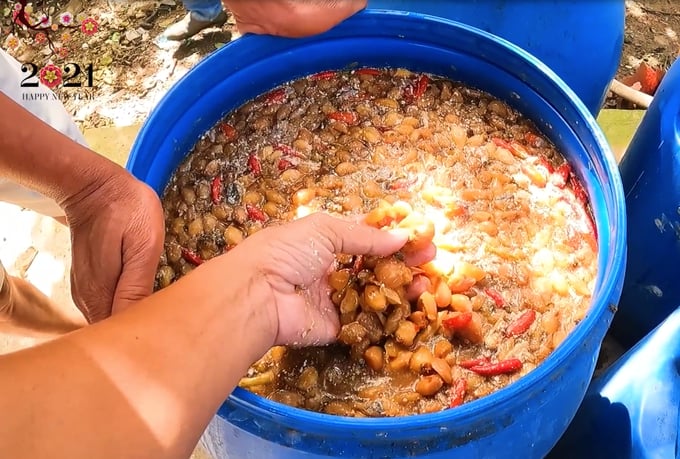
Biological products to treat pests for pomelos from fruits. Photo: Tuy Hoa.
Another well-known farmer in Vinh Hiep is 52-year-old Ngo Van Son, who has 2ha of pomelos that have been grown organically for a long time, using pesticides that are fermented and produced from the fruit.
Mr. Son explained that Tan Trieu pomelo is renowned for its flavor, which is a strength that is not universal. However, for a long time, pomelo farmers have not known how to "turn" this strength into a high income. Due to this concern, he began to "study religion," gather research materials, travel to numerous locations, consult experts and agricultural staff for advice and scientific techniques in selecting varieties, fertilizers, and care processes from tree to fruit care, and then apply this knowledge to his pomelo garden.
Son made additional adjustments to the product's direction in order to "elevate" the brand. When he returned to Ben Tre to meet a group of ornamental plant artisans and saw that they created numerous distinctive bonsai shapes, he had the idea to shape pomelos similarly. After that, he returned to begin researching and sculpting a grapefruit.
"I spent a great deal of money creating frames and typefaces, but I repeatedly failed. After more than a year and four harvests of pomelo, I was finally successful. At this point, I've gotten used to it, and I simply delegate the same tasks to many other individuals.", Son stated.
Translated by Linh Linh
/2025/05/25/4127-3-073637_820.jpg)
(VAN) Thanks to the promotion from an FAO-implemented project, vegetable production in greenhouses in Moc Chau has seen strong development, from 1.5 hectares in 2021 to nearly 50 hectares in 2024.

(VAN) FAO has recently supported USD 140,000 to implement the project 'Risk mitigation human-animal interface risks through disease control initiatives in pig farming.'

(VAN) The People's Committee of Tra Vinh province has approved an adjustment to the investment policy for the Green Hydrogen Plant project, increasing its area to approximately 52.76 hectares.
![Reducing emissions from rice fields: [2] Farmers’ commitment to the soil](https://t.ex-cdn.com/nongnghiepmoitruong.vn/608w/files/news/2025/05/05/dsc08881jpg-nongnghiep-140632.jpg)
(VAN) Clean rice cultivation model in Thuong Tan commune, Bac Tan Uyen district, is assisting local residents in achieving sustainable agriculture by substantially reducing costs, increasing productivity, and protecting the environment.

(VAN) At the conference to disseminate Resolution No. 68, AgriS introduced its digital agricultural ecosystem and reaffirmed its commitment to accompanying the Government in promoting private sector development and sustainable agriculture.

(VAN) 'Blue Ocean - Blue Foods' initiative is designed to restore marine ecosystems and establish sustainable livelihoods for local communities by cultivating a minimum of 1,000 hectares of cottonii seaweed in the first three years.
/2025/05/21/4642-3-112707_603.jpg)
(VAN) The V-SCOPE project has made direct contributions to three out of six pillars of the Comprehensive Strategic Partnership between Vietnam and Australia.